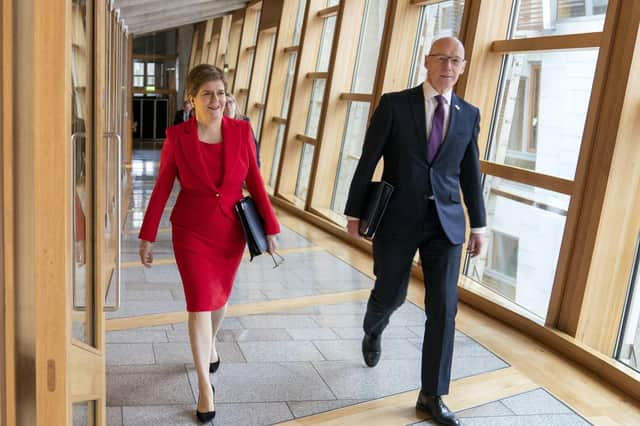Scottish Budget: John Swinney's tax increases on wealthy must produce tangible improvements to NHS – Scotsman comment


So while no one wants to pay more tax, at least some of the people in the upper two tax brackets – both hit with penny-in-the-pound increases in John Swinney’s Budget – may accept that such a move, or something similar, was necessary.
Furthermore, for those becoming increasingly concerned by the NHS crisis – evidenced by long waiting times for treatment and the difficulty in getting an appointment to see a GP – the announcement that this extra taxation, along with more money from the UK Government, will be used to increase health and social care spending by £1 billion may sweeten a rather bitter pill.
Advertisement
Hide AdAdvertisement
Hide AdHowever, what none of these people are likely to accept, indeed what would and should cause great anger, is if their hard-earned money is taken by the Scottish Government and then wasted. Given the dismal track record of the SNP in government, this is far from an unjustified fear.
As Labour’s Daniel Johnson rightly said in his response to Swinney’s Budget statement: “This government has a delivery problem.” He pointed out that some £500 million in Covid support grants had not been spent because the Scottish Government could not get them “out the door”.
He added that the Scottish Government’s excuse for a cut in building energy efficiency funding – a supposed lack of demand – “beggars belief” given the energy price crisis. Energy efficiency is an excellent way to both reduce fuel bills and cut carbon emissions, so if a fund like that is not being used, it sounds more like a badly designed scheme, than public indifference.
Another problem with raising taxes on people earning more than £43,662 in Scotland – many of whom will not have high disposable incomes, with children to look after and mortgages to pay – is that it further widens the gap between them and their counterparts in England. This creates an incentive to relocate which, in the era of widespread working from home, is much easier to do. If people leave Scotland or take other steps to reduce their tax bill, the amount of extra revenue could dwindle.
Were Scotland an independent country, moving would be more difficult, but it is not, it is part of the UK. With its focus on creating ideological differences between Holyrood and Westminster, to further the goal of independence, the SNP risks over-reaching and making tax changes that could backfire. Scotland could find itself in the worst of all worlds, with high taxes and low public spending.
This was a concern raised by the Scottish Conservatives, although their intervention lost much of its force when Swinney reminded Holyrood that they had only recently urged him to cut taxes in line with Kwasi Kwarteng’s disastrous UK ‘mini-budget’.
However, it is a potential problem that ministers must take seriously and keep a close eye on, if they are concerned with good governance and sound finances. The problem is that the eyes of their best and brightest are often so firmly fixed on achieving independence that they fail to pay sufficient attention to the practical, everyday business of government.
The SNP has long talked the talk that a majority in Scotland wants to hear, but their inability to make real and genuine progress on vital issues has seen Scotland stumble and, in some cases, start to walk backwards.
Advertisement
Hide AdAdvertisement
Hide AdIf this £1 billion injection of funds into health and social care turns into an even bigger mess than the fiasco over the apparently simple task of building two ferries, and the NHS crisis continues to get worse, Swinney and co will face the wrath of not just Scotland’s wealthiest citizens, but the whole country.
Comments
Want to join the conversation? Please or to comment on this article.